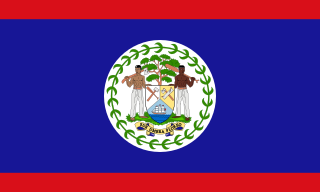
Politics of Belize takes place in a framework of a parliamentary representative democratic monarchy, whereby Queen Elizabeth II serves as head of state and the prime minister is the head of government, and of a multi-party system. Executive power is exercised by the government. Legislative power is vested in both the government and the Parliament of Belize.

The United Democratic Party (UDP) is one of the two major political parties in Belize. It is the ruling party, having won the 2008, 2012 and 2015 general elections. A centre-right conservative party, the UDP is led by Prime Minister of Belize Dean Barrow.

Elections in Belize are the duly held elections held at various levels of government in the nation of Belize.

Fiji's municipal elections of October 2002 produced results that allowed three major political parties, the Soqosoqo Duavata ni Lewenivanua (SDL), the Fiji Labour Party (FLP), and the National Federation Party (NFP) to claim a victory of sorts. The elections, which take place every three years, were for two city councils and ten town councils throughout Fiji.

General elections were held in Belize on 27 August 1998. The result was a victory for the People's United Party, which won 26 of the 29 seats and Said Musa was elected as Prime Minister for the first time. Voter turnout was 90.1%, the highest since independence.

Belize municipal elections, 2006 were a series of local elections held on March 1, 2006, to fill vacancies for town councils in Corozal, Orange Walk, San Pedro, San Ignacio, Benque Viejo, Dangriga, Punta Gorda, Belize City and Belmopan. All the councils except Belize City elected one mayor and six councillors; Belize City elected one mayor and ten councillors.

Vision Inspired by the People (VIP) is a political party established in December 2005 in the Cayo District of Belize. It first contested municipal elections in the capital city of Belmopan on 1 March 2006, receiving 20 percent of votes cast but none of the seven seats. VIP operates primarily in Belmopan, but also has a presence in the Belize and Corozal Districts.
Belize municipal elections, 2003 were a series of municipal elections held on March 5, 2003 to elect City and Town Councils in the Cities of Belize and Belmopan and the towns of Corozal, Orange Walk, San Pedro, San Ignacio/Santa Elena, Dangriga and Punta Gorda. 142 candidates ran in this election, of whom 25% were women.

A municipal election was held in Belize on 4 March 2009. Voters elected sixty seven representatives, eighteen in city councils and forty nine in town councils.

A legislative election was held in the nation of Belize on February 7, 2008. Beginning with this election, Belizeans elected 31 members to the House of Representatives of Belize instead of 29. In what was considered an upset, the opposition United Democratic Party (UDP) won the election with 25 out of 31 seats; the ruling People's United Party won six.
The Belizean municipal elections, 1996–1997 was a series of local government elections in Belize. They were held respectively on March 18, 1996 and March 11, 1997.
Belizean municipal elections, 1993–1994 was a series of municipal elections held in Belize within a period of twelve months and sandwiching a general election.
Belize municipal elections, 1989–1991 were a series of local elections held in the country of Belize in two parts. Part one was the Belize City Council election held on December 6, 1989, in which the newly elected People's United Party swept all nine seats in Belize City. Part two came more than a year later on March 25, 1991 with municipal elections in the district towns. Here the PUP won 35 of 49 seats, while the UDP won the remaining fourteen.

Municipal elections were held in South Africa on 18 May 2011, electing new councils for all municipalities in the country. Municipal elections are held every five years, and the previous municipal elections were held in 2006. The first municipal elections following the reorganisation of municipalities took place in December 2000.

Her Majesty's Government of Belize, also referred to as the Belizean Government is the democratic administrative authority of Belize, a constitutional monarchy under a parliamentary democracy. It was formed in 1981 after gaining sovereignty from the United Kingdom. The constitution is the supreme law of Belize.

General elections were held in Belize on 4 November 2015 to elect members of the House of Representatives. On 28 September 2015 Prime Minister Dean Barrow announced that he had advised the Governor-General to dissolve the National Assembly and to fix Wednesday 4 November 2015 as the date for the next general elections.

Municipal elections were held in Belize on 4 March 2015. Voters elected 67 representatives, 18 on city councils and 49 on town councils. The elections were a decisive victory for the ruling United Democratic Party, which won 62 out of the 67 seats nationwide. The opposition People's United Party won the remaining seats, losing control of town councils in Dangriga and Punta Gorda, maintaining a majority only in Orange Walk Town.
Municipal elections were held in Belize on 7 March 2012 at the same time as the Belizean general election. The United Democratic Party (UDP) won six municipalities, while the People's United Party (PUP) won three municipalities.
The council of the City of Cape Town in the Western Cape, South Africa is elected every five years by a system of mixed-member proportional representation. Half of the councillors are elected by first-past-the-post voting from individual wards, while the other half are appointed from party lists so that the total number of party representatives is proportional to the number of votes received. By-elections are held to replace the councillors elected by wards if a vacancy occurs.









